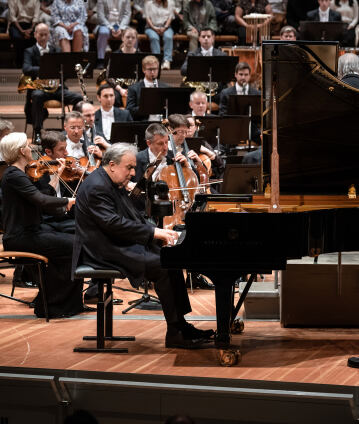Zubin Mehta and Yefim Bronfman

Zubin Mehta and Yefim Bronfman have been associates for many years. Here, they perform Béla Bartók’s Piano Concerto No. 2, and Zubin Mehta conducts Tchaikovsky’s Fourth, which depicts the composer’s suffering in the world, but also celebrates the joys of life at the end. The Romantic prelude is Schumann’s Genoveva Overture.
In the 1920s, Béla Bartók, whose tonal language was still met with scepticism by the public, performed in the USA and the Soviet Union – twice also with the Berliner Philharmoniker. In 1930, he began work on his Second Piano Concerto, which was premiered three years later in Frankfurt with the composer at the piano. The guest performance remained Bartók’s last visit to Germany: he emigrated to the USA in 1940 because of his opposition to National Socialism and Fascism. Compared to his complex and austere First Piano Concerto, the composer described his Second as “more pleasing”. The work is no more pleasing than any other Bartók, but it is certainly captivating and impressive. Unusual instrumentation – the strings are silent in the first movement –, rhythmic verve and superb virtuosity hold the audience spellbound.
Tchaikovsky originally wanted to dedicate his Fourth Symphony to a “friend” – not, as expected, a male friend, but a female one: the industrialist widow Nadeshda von Meck, who supported the composer financially for years. In the extensive correspondence with his patroness, Tchaikovsky characterises the theme that appears in all four movements of his symphony as the embodiment of fate. As in Beethoven’s Fifth Symphony, its power is only overcome in the triumphant finale.
The concert opens with the poetic overture to Robert Schumann’s only opera Genoveva. Zubin Mehta and Yefim Bronfman are two artists who have been among the Berliner Philharmoniker’s closest artistic partners for several decades.
© 2023 Berlin Phil Media GmbH
Related interview
Artists
Our recommendations
- Tugan Sokhiev and Yefim Bronfman perform Beethoven
- Yannick Nézet-Séguin makes his debut with Berlioz and Prokofiev
- Daniel Barenboim and Yefim Bronfman perform Brahms’s Piano Concerto No. 1
- Season opening 2012: Simon Rattle and Yefim Bronfman
- Simon Rattle and Yefim Bronfman
- Simon Rattle conducts “Russian rhythms” at the Waldbühne